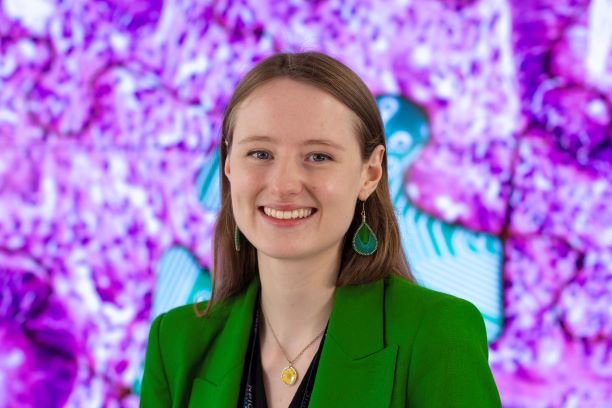As Leeds celebrates the 10th anniversary of Leeds Digital Festival, the largest open tech event in the North, the city’s data and digital offer has never been stronger – underpinned by a unique, citywide approach to cultivating tomorrow’s talent, today.
Recent data shows that the Leeds tech sector is growing 125% faster than the national average[1]. Coupled with its status as a “health innovation powerhouse”, it’s no wonder the UK’s third largest city is home to 3,000 digital and data companies, and was recently named as the location for the Medicines and Healthcare products Regulatory Agency’s (MHRA) new digital hub.
Here, world-leading work is making science fiction a reality, from personalised cancer vaccines to robotic surgery, and a pioneering population health approach is backed by a unique linked dataset – unlocking unparalleled advances in neighbourhood health.
But this rapidly evolving ecosystem is not only transforming health and care in the here and now – it’s shaping the future workforce through novel training and development initiatives. From world-class academic programmes to inclusive city-wide digital strategies, Leeds is building a robust talent pipeline ready to meet the health and care demands of today, and the global challenges of tomorrow.
Powering the pipeline for AI-driven health innovation
Home to three major universities, Leeds offers top talent diverse pathways into its health and care research and innovation ecosystem. The city is also home to more than 44,000 tech professionals and around 11,000 tech-focused students.
Through education, research and innovation activities that underpin a globally integrated health and social care system, the University of Leeds is one of the leading organisations fuelling this all-important pipeline.
Owen Johnson, Associate Professor at the University of Leeds, reveals how the organisation’s interdisciplinary focus on transforming health and care increasingly includes AI and digital training initiatives to nurture the next generation of health innovators through cutting-edge, research.
A standout initiative is the UKRI Centre for Doctoral Training (CDT) in Artificial Intelligence for Medical Diagnosis and Care, of which Owen is a Co-Director. Since 2019 it has supported around 50 PhD researchers with £7 million in funding, fostering a diverse and inclusive research training environment, targeting a 50-50 ratio of female to male graduates drawn from a broad range of health and STEM backgrounds.
Owen explains: “Each student is guided by both AI and healthcare experts, making sure their research tackles real-world medical problems. This teamwork across fields like epidemiology, biology, and data science is supported by over 100 academic mentors, and benefits from Leeds’ single-campus layout, which makes collaboration easy and natural.”
Powered by unrivalled partnership working
And there could be no better location for this collaborative approach to thrive: Leeds is a national hub for digital health innovation, powered by unrivalled partnership working.
As well as marking a 10 year milestone for its iconic Digital Festival, this year the city is also celebrating a decade since Leeds Academic Health Partnership was established. The biggest of its kind in the UK, the Partnership brings together the city’s three universities, local NHS organisations, Leeds City Council, Leeds City College, regional and third sector partners to solve some of the hardest health challenges.
Owen explains how CDT researchers have access to richly collaborative innovation communities, including Nexus, launched by the University in 2019 to revolutionise how academia and industry work together, and Leeds Teaching Hospitals Trust’s Innovation Pop-Up.
“These partnerships are not only advancing research, but also embedding innovation into the fabric of Leeds’ health and care system, creating the perfect environment for SMEs and spin-outs to bridge academia, industry and the NHS – to build, test and scale, all in one place.”
“Leeds’ highly networked digital health community further strengthens its talent pipeline” says Owen. “Initiatives like Leeds Digital Health bring together clinicians, regulators, tech companies, academics, and patients in collaborative, informal settings.
“This all fosters cross-sector relationships and helps integrate emerging talent into the city’s thriving health innovation ecosystem, making Leeds a prime destination for digital health talent.”
Facing global and local challenges head on
For Owen, healthcare is simultaneously one of the most meaningful and the most complex sectors to work in, offering a rare combination of technical challenge and public good, which continues to inspire his passion for using AI to improve lives.
Owen explains: “As part of the CDT, we are shaping the future of clinical practice by training researchers to deploy AI responsibly and compassionately. The goal isn’t to replace clinicians, but to support them, automating routine tasks to free up time for human connection and complex decision-making.
“From rapid image analysis to triaging cases, AI is poised to become as integral to medicine as stethoscopes and handwashing, provided its adoption is guided by ethical rigour and clinical insight.
“We’re playing a vital role, training researchers to build AI that enhances clinical safety and supports compassionate care,” Owen says. “In a world often polarised by hype or fear around AI, Leeds is focused on delivering trusted, practical solutions. For example, within the CDT we have a researcher in fairness, who is specifically looking at where existing NHS AI tools can not only perform better from a technical point of view, but work better for everyone.”
Leading the way in applying AI to healthcare at scale
A standout example of Leeds’ trailblazing impact in digital health is the National Pathology Imaging Co-operative (NPIC), a major collaboration between Leeds Teaching Hospitals NHS Trust and the University of Leeds. NPIC has become the UK’s centre of excellence for AI-driven pathology imaging, using advanced analytics to transform how cancer tissue samples are diagnosed. This innovation is speeding up processes, improving accuracy, and setting new standards for clinical practice.
The CDT has played a direct role in NPIC’s success in a symbiotic partnership, where PhD researchers contribute to its work, and many are now employed within the initiative.
NPIC exemplifies how Leeds is applying AI to healthcare at scale, delivering real-world impact and creating meaningful career pathways for the next generation of digital health leaders.
As a member of the CDT, Dr Lucy Godson’s research focused on using AI to predict melanoma patient outcomes through digital pathology, applying techniques like graph neural networks and survival analysis. After completing her PhD, Dr Godson joined the NPIC team and now develops advanced AI tools to support melanoma diagnosis and treatment.
Dr Godson explains: “Thanks to the CDT’s leadership, there was strong collaboration between experts in AI and clinicians working in healthcare. This teamwork helped shape a supportive research environment and gave students access to resources that would otherwise be hard to reach.
“As a PhD student, I was able to use powerful computing systems at the University of Leeds, as well as national high-performance platforms. These resources were available because of the university’s partnerships and were essential for running complex AI models and processing large datasets.
“Just as important was the clinical access the CDT provided. I regularly attended digital pathology meetings at the NPIC at St James’ Hospital. These sessions were incredibly valuable, providing direct feedback from pathologists and scientists working on real-world problems. Their insights helped me ensure my AI research was relevant to actual clinical needs, which made my work more impactful and helped me grow professionally.
Dr Godson concludes: “Leeds combines bold healthcare innovation with a thriving academic ecosystem, hosting international conferences like Medical Image Understanding and Analysis (MIUA) and driving initiatives such as the national digital pathology programme, making it an ideal place to grow a career in AI and data science.”
Leveraging AI for equity
The Masters by Research (MRes) in Data Science and Analytics in Healthcare, also run by the University of Leeds, is supporting academia and the NHS to work together to build future-ready talent.
Delivered in partnership with NHS England, the two-year, part-time programme supports around 10 early- to mid-career NHS data analysts in Leeds each year. With tuition funded and study time protected by their employer, participants are empowered to evolve from analysts into research-capable data scientists, equipped to produce rigorous, publishable work.
Programme Manager of the MRes, Owen highlights how the impact of this is already visible: “One student’s research, published in Nature Communications Medicine[2], revealed how continuity of midwifery care significantly improves outcomes for Black women, demonstrating the power of data-driven insight to inform policy and drive equity in healthcare.”
By examining large-scale NHS datasets and applying machine learning models to identify patterns in care delivery and outcomes, the study revealed that consistent care from the same midwife significantly reduced complications and improved birth experiences for Black women in settings across the UK. This research not only highlighted national systemic inequalities in maternity care but also demonstrated how AI can uncover hidden trends in health data, offering powerful evidence to inform policy and promote equity in healthcare.
With 37 NHS data scientists trained and eight more currently enrolled, the MRes is embedding researchers in real-world environments, helping shape a skilled, evidence-led workforce ready to lead the next wave of AI innovation in health and care.
Supporting the government’s new 10-year plan for health
The UK government’s 10-year plan for health outlines three transformative shifts: from analogue to digital systems, from treatment to prevention, and from hospital-based to community care – and Leeds is already a step ahead on delivering against these.
Owen explains: “Strong collaboration across organisations like the University, Leeds City Council, NHS regional teams, and Leeds Teaching Hospitals NHS Trust, enables Leeds to lead the way in creating scalable, real-world solutions which align to national priorities.”
“For example, the CDT can leverage AI-driven research to improve early diagnosis and prevention, using historical blood test data to detect early signs of cancer, enabling timely, less invasive interventions and better long-term outcomes.”
Recognising Leeds’ trailblazing ability to transform health and care, the Government has chosen the city to drive forward its flagship health mission as part of a new national pilot programme. As part of the Community Mission Challenge, more of the groundbreaking solutions developed in Leeds will not only benefit and be shaped by local people, but will extend further – revolutionising care nationally and globally.
Research, clinical expertise and enterprise
The UK government’s decision to establish a new MHRA digital hub in Leeds is a further, powerful endorsement of the city’s long-standing model of co-location, bringing together cutting-edge academic research, world-leading clinical expertise, and a global community of entrepreneurial businesses. This collaborative ecosystem, anchored by institutions like the University of Leeds and Leeds Teaching Hospitals Trust, has enabled Leeds to become a recognised hub for advancing digital health solutions.
“When MHRA leadership visited Leeds, they saw more than just infrastructure, they experienced a culture of genuine collaboration,” says Owen.
“Leeds offers not only proximity, but active engagement – real, live opportunities to work alongside researchers, clinicians, regulators, and entrepreneurs across organisational boundaries, in a shared mission to improve healthcare.”
As part of the visit, Secretary of State for Health and Social Care, Wes Streeting described how the new MHRA hub will mean scientists get data for research quicker, inspectors can develop tech to spot problems faster, and patients get better results – and why Leeds is the ideal location for this transformative new resource:
“As a healthcare innovation powerhouse, Leeds is the perfect place to bring together the Medicines and Healthcare products Regulatory Agency’s regulatory expertise with a thriving tech community, world-class universities, and strong NHS presence.”
Shaping the future through digital talent
Leeds is a world-leader in AI, and thanks to its razor-sharp focus on cultivating top talent, it’s no wonder that the city is out-pacing London when it comes to AI job growth. According to a recent report, AI firms in Leeds are expanding their workforce by 22% annually; more than triple London’s 7.2% and far above the national average of 4.8% [3].
As Leeds Digital Festival celebrates and showcases the city’s market leading strengths in digital, data and AI, its open access approach straddles sectors and supercharges collaboration. And underpinning the exciting tech and dazzling digital developments on show, it is the city’s – people – a diverse and talented innovation community – who continue to power such extraordinary progress.
Through academic excellence, industry partnerships, and inclusive strategies, Leeds is ensuring it has the right people, with the right skills, to make this the right place for advances in health and care, now and in the future.
- Leeds Digital Festival runs until Friday 3 October, so check out the wide range of amazing events still to come: https://leedsdigitalfestival.org/events/
- And discover the organisations and infrastructure that makes Leeds a digital and data powerhouse: https://healthinnovationleeds.com/ecosystem/#Powerhouse
_________________________________________________________________________________________
[1] Leeds digital tech is outgrowing the national average – https://thedatacity.com/blog/leeds-digital-tech-is-outgrowing-the-national-average/
[2] Press Release: Study suggests continuity of midwife care can improve outcomes for Black women and support uptake of breastfeeding – https://arc-sl.nihr.ac.uk/news-insights/latest-news/study-suggests-continuity-midwife-care-can-improve-outcomes-black-women
[3] Leeds outpaces London in AI job growth – https://www.bdaily.co.uk/articles/2025/09/08/leeds-outpaces-london-in-ai-job-growth
___________________________________________________________________________________________
Header image: istock.com/MicroStockHub
Sideline image: istock.com/Just_Super




